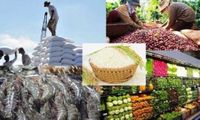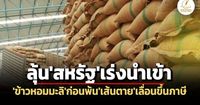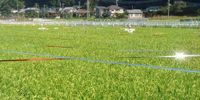In a significant development for Thailand's rice export sector, the United States has announced a temporary delay in the implementation of a steep 36% import tariff on Thai rice, a decision that could have profound implications for the industry. This delay, which extends for 90 days, comes amidst rising tensions in global trade and is seen as a critical opportunity for Thai exporters to stabilize their market position.
On April 2, 2025, U.S. President Donald Trump declared a reciprocal trade policy that would impose a 36% tariff on various imported goods from Thailand, including rice, effective from April 5, 2025. However, the announcement of a 90-day deferment in the tariff increase has sparked a renewed interest among U.S. buyers in Thai jasmine rice.
Chukiart Opaswong, the honorary president of the Thai Rice Exporters Association, expressed cautious optimism regarding the situation. "When the tariff was first announced, orders from U.S. partners came to a halt. But with the recent news of the 90-day delay and a reduced initial tariff of 10%, inquiries from customers have started to trickle in again," he said. This indicates that even a slight reduction in tariffs can significantly impact purchasing behavior.
Historically, the U.S. has been a major importer of Thai jasmine rice, accounting for nearly 50% of Thailand's total jasmine rice exports, which is approximately 630,000 tons annually. Chukiart noted that the delay in the tariff increase could help maintain jasmine rice prices, which were expected to drop following the initial tariff announcement. "We anticipate that after the Songkran festival, trade activity will pick up as importers look to stock up ahead of potential price increases," he added.
However, there are concerns about the long-term effects of these tariffs on Thailand's rice exports. Chukiart warned that if the tariffs were to be implemented at the full rate, it could lead to a significant decrease in rice sales, resulting in surplus stocks within Thailand and ultimately affecting domestic rice prices. "The impact of a 36% tariff would be severe, and we are hopeful that the temporary reprieve will lead to increased orders before the deadline," he explained.
In the first quarter of 2025, Thailand exported 2 million tons of rice, which represents a 53% decline compared to the previous year. This drop is partly due to Indonesia's cessation of rice imports, which had previously purchased 4 million tons, including 1 million tons from Thailand.
Looking ahead, the Thai Rice Exporters Association has set an export target of 7.5 million tons for the entire year. Chukiart believes that if Indonesia resumes its imports in the second half of the year, Thailand could still meet its targets. "If Indonesia imports between 1 to 2 million tons, we can expect to maintain our export figures. We are optimistic that the 7.5 million ton target is achievable," he stated.
Meanwhile, Hong Kong is also taking steps to protect its small and medium-sized enterprises (SMEs) amid escalating trade tensions with the U.S. and China. On April 13, 2025, the Hong Kong government implemented three new measures aimed at supporting SMEs against shipping risks exacerbated by the ongoing trade war.
These measures, announced by Chief Executive John Lee Ka-chiu, include a 50% reduction in insurance premiums for exporters, an extension of coverage without additional costs until June 30, 2026, and adjustments to insurance rates for emerging markets to align more closely with traditional markets like the U.S. and Europe. "These initiatives are designed to bolster confidence among local businesses, particularly SMEs looking to expand into new markets," Lee emphasized.
Agnes Chan Sui-kuen, chairperson of the Hong Kong Business Association, supported these measures, stating that they would help SMEs navigate the challenges posed by the trade war and explore opportunities in new markets such as ASEAN and the Middle East. "Hong Kong's SMEs are resilient and ready to seize new opportunities to reduce reliance on traditional markets," she remarked.
In another development, the Thai Ministry of Finance is set to meet with the Bank of Thailand's governor on April 16-17, 2025, to discuss the economic implications of President Trump's policies. Deputy Prime Minister Phichai Chunwachiras highlighted the importance of assessing the potential impacts on the Thai economy, including currency fluctuations and financial market stability.
The upcoming discussions will focus on how the government can support exporters facing challenges due to the volatile tariff landscape. There are plans to consider monetary easing measures and closely monitor the liquidity in the financial markets, ensuring that Thai businesses can withstand the pressures of changing global trade dynamics.
Phichai noted that the Thai government is committed to fostering a favorable environment for trade and investment, particularly in light of the significant U.S. bond holdings by Thailand. The discussions aim to prepare Thailand for uncertainties in the global economy and to proactively manage its economic strategies for the second half of the year.
As the situation continues to evolve, both Thai exporters and the government are navigating a complex landscape shaped by international trade policies. The temporary reprieve from the U.S. tariffs presents a critical window for Thai rice exporters to reinforce their market presence while also adapting to the shifting global economic environment.
In summary, the recent developments highlight the importance of strategic planning and flexibility for businesses in the face of changing trade policies. With the right measures in place, Thailand aims to not only weather the current challenges but also seize new opportunities in the global market.









